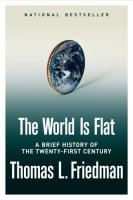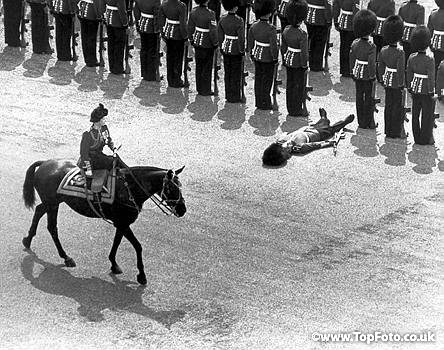I came across a really amazing LiveJournal community – photo_polygon (via thesz). Basically, it’s a stream of excellent journalism photography. Pictures of the world as it is. Strongly recommended.
Tag: world
The World Is Flat
 I have just finished reading the book by Thomas Friedman “The World Is Flat“.
I have just finished reading the book by Thomas Friedman “The World Is Flat“.
As you’ve probably noticed I am not a big book freak. I rarely read anything outside of very technical literature. But I felt that I absolutely had to read this one.
I ordered immediately after I saw this video, which is Thomas Friedman’s speech in MIT, in which he talks about the globalization and the flat world. Basically, what he did in MIT, was a very quick and brief overviwe of the first three chapters of the book. His speech was amazing. He was talking in very simple language about really complex things. He made a lot of stuff so much easier to understand. And he made some really interesting connections.
I have to say though, that many of the things he was talking about weren’t new to me. I was thinking about them myself. I just couldn’t possibly form them into any shape or express them in any understandable form.
Friedman did very clearly. And he introduced a lot of examples. And he added a lot of credebility to what he was saying by interviewing a whole lot of smart people.
While the book is written in a very simple language and with a lot of examples, it was difficult to read for me. It was so thought-provoking that I had to stop about every two or three pages for an hour or a day to re-think everything I read. It took me alsmot two month to read 470 pages. And I am sure I’ve missed a lot too. I’ll have to re-read it in the near future.
This is the most complete and wide view of globalization that I have come across. Ever. The book doesn’t just talk and talk about some abstract forms. It shows the very specific connections between events that happened throughout the human history, with more focus on the last 30 or so years. All events and connections are looked at from a multitude of angles – political, economical, cultural, technological. Each of those angles is futher down broken into a multitude of options. Examples from American, Japanese, Chinese, Indian, African, and European cultures are given. Interviews were conducted with a whole lot of people from ex-presidents and current ministers to CEOs of international corporations to religious leaders, as well as plenty of common people from a multitude of backgrounds.
Globalization aside, this book is the best piece of journalism that I’ve read in a long long while. A job well done. Truly a bestseller. I would seriously recommend this book to anyone. Yes, to anyone. Not only people who are interested in globalization, but to all people who are interested in their own present and future. There are lots of questions, and there are lots of answers. You’ll surely understand the world better after reading this book.
I do.
Internationi Women’s Day
Today is a major international holiday, although most of the internation community has no idea about it. Internation Women’s Day is a huge holiday in Russia and many other countires of the ex-Soviet platform. It’d probably be a good thing if it was better recognized worldwide.
Anyway, I’d like to take this opportunity to congratulate all women of the world with his holiday. I wish them all happyness, love, and general well-being. Fight for your rights, make your choices, but also, please, stay as beautiful and pretty as you all are.
Thank you all for balancing out our crazy half of the world! Please, stay with us.
New people aren’t anymore
The other day I met a few new people in the bar. Most of them were younger than me, but not all of them had IT-related jobs and hobbies. While we were exchanging contact information, I kept thinking about the technology and how it affects our lives.
15 years ago, when meeting new people name and place of work or address were sufficient. People were asking for a phone number, but not everyone had it. Contacting a person was complicated. Espeically if he didn’t have the phone number (like I). Even if he had a phone number, one had to find out the appropriate hours to call.
10 years ago phones became more widespread. But email was still a new thing for most people. Not everyone had it.
5 years ago mobiles started to jump in. Approrpiate hours became pretty much obsolete – call during the daylight of the timezone in question and you’ll be fine. Email got more common. Instant messengers became popular too.
This year I met a lot of new people. And, although, most of them were from my area, I had a choice of mobile phone, email, and ICQ number to choose from in order to contact them.
That other day though was a totally other story. Everyone called each other on the mobile to save the number. Than we continued with ICQ numbers. Than with blog URLs (many people use LiveJournal these days). A notebook computer appeared out of nowhere and we connected to pub’s free WiFi access point and looked through each other’s blogs and journals. Within 15 minutes or so everyone know a whole lot of everything about each other – hobbies, interests, age, lifestyle, who travelled where and when, etc. We saw a bunch of pictures and even some common friends, although we were from different parts of the world.
When we left from the pub two hours later, I had a feeling that we knew each other pretty good. Missing bits could be easily reconstructed by studing all the available information. Or talking on the Internet. Directly. Any time.
It doesn’t matter anymore where you live. All you need to have is a mobile phone (which supports SMS), instant messenger account (ICQ, MSN, Yahoo! – whatever works for you), and an online journal (standalone blog or LiveJournal or both). Interestingly, it’ll take you less than an hour to get all three. The world is definetely getting smaller…
Where do you want to go today?
Don’t close this window just yet – this post has nothing to do with Microsoft. On the contrary even…
For a few years now I am nursing the idea of working for a humanitarian or environmental organization. I haven’t yet researched the subject, but just try to imagine how good or bad that would be for me personally. So far, I can imagine all the good things, except maybe for the salary.
Lately I was trying to figure out what organization would I choose to work for if I had the free choice. Would it be Greenpeace? Green cross? Red Cross? UNHCR? DHA? There are so many choices that it’s really hard to pick one. All of them seem to have good intentions and all of them have a list of good deeds under their belts.
If you were the one to choose, which organization would you choose and why?
In case you know only Greenpeace, here are a few lists for you:
- ReliefWeb » Directory of Organizations
- Humanitarian Organizations
- Environment Web Directory
- List of environmental organizations at Wikipedia
